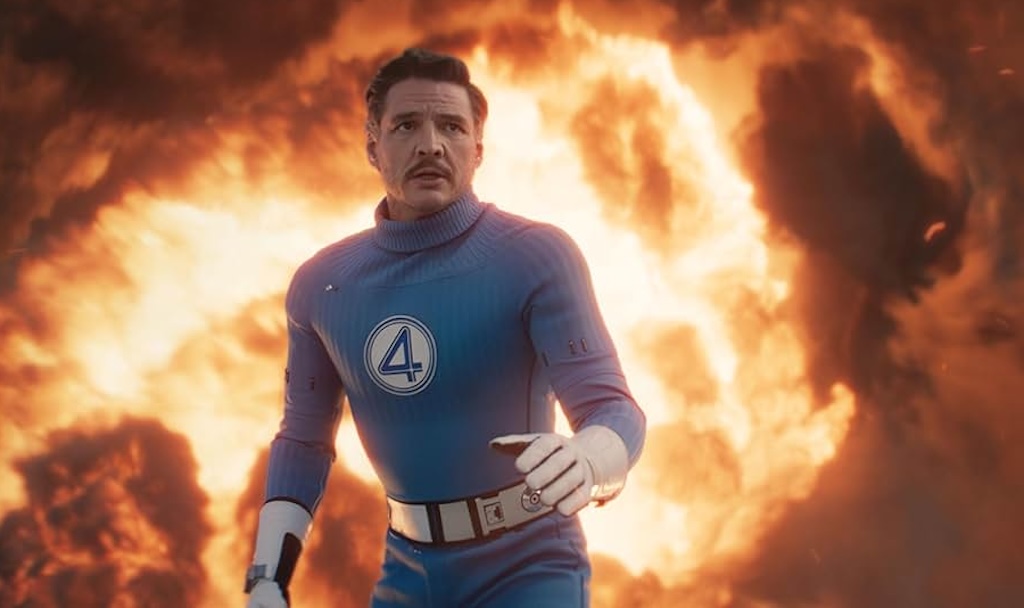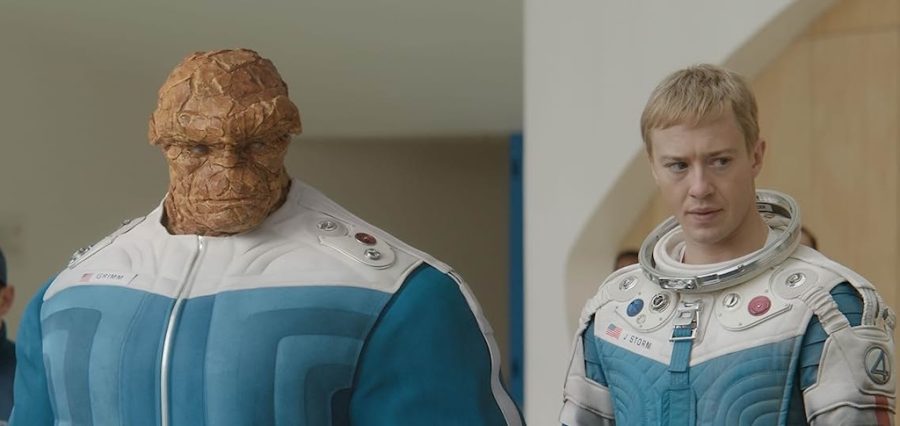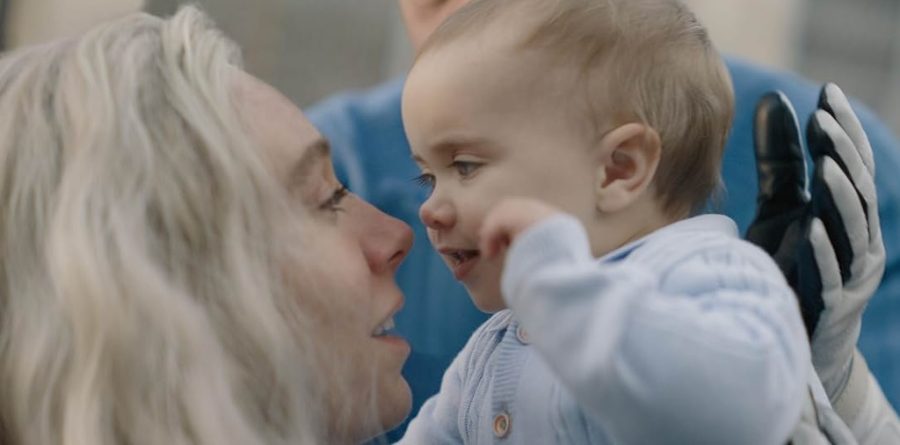Fantastic Four: First Steps Is Light, Bright, and Kinda Boring
Will we ever get past the dominance of superhero movies in mainstream American cinema? Will they ever become any good?

Pedro Pascal stars as Reed Richards, aka Mr. Fantastic, in Fantastic Four: First Steps, 2025. (Marvel Studios)
The new light, bright, poppy Fantastic Four movie directed by Matt Shakman (WandaVision) is a big hit just two weeks after James Gunn’s light, bright, poppy Superman was a big hit, which seems to indicate a new path to success for superhero movies after a dip in popularity had suggested that maybe audience interest internationally was waning at last.
No such luck! For those of us not particularly into this genre, it seems incredible that we’ll never get past its dominance over mainstream moviemaking in our lifetimes. Whether dark and doomy or colorful and full of laughs, we will always have the superhero movie with us.
If there were to be future generations far enough forward in time to look back at the United States, the center of superhero movie production, with some measure of calm, as well as a thriving cinema still ongoing a hundred years hence — both pretty dubious prospects — what would our descendants think of us based on this endless cycle of zillion-dollar fantasies of unitard-wearing saviors with godlike superpowers saving the world over and over again? Meanwhile nobody in power saved the world in reality — hardly made a move to save it, ignored the dire consequences of climate change, did fuck all to stop supporting genocide, waged war relentlessly for the profit of a few oligarchs, let our horribly corrupted democracy collapse into authoritarianism, watched an education system fall apart with no sane replacement system, allowed the entire working class to sink into economic precarity with no way out…
When you think of it that way — and I’m sure many have — it really becomes sickening to watch these films full of overblown heroics: such obvious compensation for the lack of courage, integrity, and willpower displayed in real life.
I had plenty of time to ponder this galling point while watching The Fantastic Four: First Steps, which sets a leisurely pace. You’re encouraged to drink in the cheery retro sets, costumes, and props that seem to locate us in a perpetual high-modernist early 1960s. Naturally! That was quite a hopeful time in American culture. The very furniture, with its inspired yet affordable mass-produced designs, announced its ambition to foster widespread human thriving. There’s no such idealistic home décor anymore. Just try to buy an Eames chair that was once emblematic of great furniture for the masses — nobody can afford one but the affluent.
The group members of the Fantastic Four are all very nice. We get flashbacks to quickly fill in the backstory about how they bonded to become a makeshift family — they were four astronauts who encountered a cosmic anomaly in deep space that altered their DNA, giving them superpowers as well as crosses to bear. There’s Reed Richards, aka Mr. Fantastic (Pedro Pascal), a scientific genius whose body can also stretch to impossible lengths. He suffers from an excess of rationality that impairs his ability to empathize. He’s married to Sue Storm, the Invisible Woman (Vanessa Kirby), who’s distinguished by her emotional intelligence, which is a pretty stereotypical role for the only major female character. She can turn invisible and generate force fields. She’s pregnant with a potential superbaby whose powers are unknown till the end of the film.
Living in the same spacious apartment with Reed Richards and Sue Storm, and having dinner with them every night while acting like a pair of aging sons suffering a major failure to launch, are Sue’s brother Johnny Storm, the Human Torch (Joseph Quinn), who can fly at great speeds and light himself up at will, and Benn Grimm, aka The Thing (Ebon Moss-Backrach), who returned to Earth with a super-strong physique that makes him look like a mobile pile of rocks. He feels isolated by his stony appearance and is further tormented by the popularity of a line spoken by his animated avatar in a hit Fantastic Four cartoon, which people are always asking him to say: “It’s clobbering time!”

Everyone loves the Fantastic Four for protecting planet Earth, and there are many shots of cute and colorful crowds of extras in 1960s costume cheering them on. The Four’s popularity wanes sharply, however, when they can’t come up with a ready solution to the looming threat posed by alien god Galactus (voiced by Ralph Ineson). Driven by an insatiable appetite for world-eating, he sends his “herald,” a svelte metallic female named Silver Surfer (Julia Garner), to announce his plans to consume Earth. The only way to head him off is to give him Sue Storm’s and Reed Richard’s superbaby, who will somehow absorb Galactus’s vast hunger, thus freeing the dark god to do something else like, I don’t know, take up tai chi or kayaking.
Will they sacrifice their child for the greater good of the citizens of Earth?
Since you already know that they won’t, meaning the Four will have to find some other convoluted way to rout Galactus, there isn’t a great deal of tension about this decision. But it generates a big climactic scene when Sue Storm, carrying the baby, who is naturally super cute, confronts an angry mob and defuses their rage by making some crazy speech about how they’ll have to solve the Galactus problem together, all the people of Earth, as one gigantic family. This Family of Man appeal is all kinds of bizarre, with the phrase “as a family” repeated portentously by Sue Storm in close-up, like an incantation.

Though again—pretty obvious what the fantasy is here. The one thing you’re virtually guaranteed not to get in our exhaustingly divided world is everyone coming together, powered by a large-hearted sense of our human kinship, to work for the good of all.
While audiences are obviously turning out in droves to see this movie, especially Fantastic Four comics fans who’ve been waiting patiently through failed adaptations in the 2000s, it seemed to me a little on the sleepy side as far as pacing and level of narrative excitement. And the Pedro Pascal infatuation, shared by legions, which would normally charge this material, is inevitably beginning to pall a bit, because Pascal stars in everything now. Plus his main challenges in the role of Reed Richards are to fret quietly and write supposedly brilliant things on chalkboards while still looking hot, which is so easy for Pascal that it hardly registers.
Other than Pascal, the other biggest potential sources of energy in the cast are pushed into supporting roles or even cameos. Ebon Moss-Bachrach, a powerhouse performer in The Bear, doesn’t have enough to do in First Steps, especially since he’s CGIed as The Thing and we only hear his voice most of the time. Julia Garner’s Silver Surfer is quietly fascinating, both superb and tragic in her metallic gliding through galaxies to do Galactus’s bidding. Pretty soon we’re with Johnny the Human Torch, who has a crush on her, wondering when we’ll see Silver Surfer again, but how much heralding can be required of her in one storyline?
Paul Walter Hauser as Harvey Elder, or the Mole Man, ruler of the underworld society Subterranea, adds a great jolt of comic resentment every time he appears, but he’s only got about two minutes of screen time, a terrible waste of Hauser’s surefire dynamism. And Natasha Lyonne, always a firecracker, has a similarly tiny part as a lively schoolteacher who’s The Thing’s love interest.
Presumably all of these characters will get more screen time in the many inevitable sequels (she typed wearily). I try to be gracious about people’s pop culture longings and the enormous fandom for superhero stuff. But there’s such a lack of other strong trends in cinema beyond routinely overrated horror films, I sometimes despair. What about the rest of us? We go to the movies too, we who are generally bored pallid by the superhero film which has glutted the movie market for decades.
We’re cursed to live in interesting times and ought to have our share of interesting film movements to reflect that.